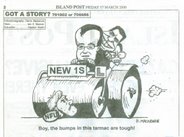Fuel costs and a fuel duty regulator
That the Parliament notes that the price of diesel is now over £1.30 in the Western Isles and across Scotland’s island and remote communities, making it probably the most expensive diesel in the western world; further notes that fuel costs now represent an ever increasing burden in the Western and Northern Isles, not least for businesses and fishermen, some of whom report 80% increases in diesel costs in the last two years; notes that the main company delivering fuel to the islands deposits fuel at differing costs at different ports on the west coast despite the fact that the same vessel is used; notes the irony of an oil-producing nation putting its motorists, businesses, fishermen and rural businesses in this impossible position, and finally notes the various measures that exist in parts of France, which make cuts in fuel duty in the remotest areas.
Presumably the suggestion about a regulator will come in the debate, and it will make very interesting reading to see just how that can actually be introduced, as the calls to date have been vague and unclear. And impractical.
As an example, when petrol costs 107.9p per litre it is split 32.60p for the product, 50.35p for the fuel duty, 8.88p for the retailer and 16.07p in VAT.
As I understand it, the proposal is that the Government yield should remain constant by varying the fuel duty.
So if the price of petrol ex-refinery increases by 50% to 48.90p and with 8.88p to the retailer, the Government should still take only 66.42p, giving a pump-price of 124.2p. (Which includes VAT of 18.5p and fuel duty at 47.92p)*
The the effect is to slow the growth in prices, not prevent them
Oh, yes; and slow any drop in prices too.
Then there is a hugely practical problem for some of those whom this measure is targeted at.
Bus operators and fishermen can reclaim the duty by completing a form certifying consumption and the duty rate applicable. These forms allow for three or four rates in any one year, but under this proposal, the applicant (or his accountant!) might have to schedule 200 different daily rates to make the claim. And someone then has to check this.
Of course, the motion is nonsense and more about grandstanding that achieving anything, as the Treasury will pay no more attention than if it was the subject of a poll on this blog.
The fundamental dichotomy is that we are all (supposedly) trying to stop our addiction to fossil fuels and promoting green energy, whilst car drivers are screaming that their petrol costs are going up.
Global demand is currently just behind global supply, and demand is expected to increase as the Chinese economy grows. What happens when supplies dry up? Provide subsidised bread to the masses to keep them happy, or the harsh face economic truths? Personally, I expect oil prices to continue to rise, and we will all have to make efforts to reduce consumption - or be made to through fiscal measures.
As far as the islands are concerned, the real ambition should be to have a duty-free and VAT-free status, like the Canaries, which will encourage growth and a self-sustaining economy at minimal cost to the Public Purse. Anything else but is a sticking plaster.
* According to Angus MacNeil MP, the yield to the Treasury should stay the same. So he presumably means that if increased prices reduce demand then the fuel duty rate will increase to ensure no loss to the Exchequer.







1 comment:
thats one hell of a presumption.
Post a Comment